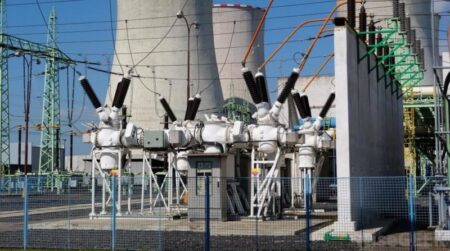Who is Nigeria’s Minister of Power?
Mr. Adedayo Adelabu is Nigeria’s incumbent Minister of Power. Adelabu was a former deputy Governor at the Central Bank of Nigeria (CBN).
The Most Troubled Ministry in Nigeria
Between 1999 to 2007, President Olusegun Obasanjo’s administration spent NGN374.65 billion or $2.88billion on the power sector, but there was no result.
Between 2007 to 2010, the administration of Alhaji Umar Musa Yar’adua spent NGN442.4billion or $3.28bn on Nigeria’s power sector, but there was no result.
As if Goodluck Jonathan had magic, his administration pumped NGN293 billion or $1.89 billion into the power sector, yet more companies close shops of poor power supply.
At the time of this report, the government of President Muhammadu Buhari has spent NGN900bn or $2.95 billion, according to Budget Office, but the country has never generated 10,000 megawatts for its more than 200 million people.
Nigeria’s ministry of Power is the most ineffective ministry since its creation as several billions of dollars invested in power generation has not yielded anything even as Nigerians continue to pay for what they didn’t consume.
Previous Efforts to Reform Power in Nigeria
There was a massive reform during the second term of Obasanjo when NEPA was renamed Power Holding Company of Nigeria (PHCN) in 2005
What followed was the privatisation of PHCN and privatization of the power generation companies (GENCOs) and distribution companies (DISCOs) on November 1, 2013 during Jonathan’s government.
Some of the actions taken by the government to reform the ministry to discharge its duties include the National Electric Power Policy (NEPP) of 2001, the Electric Power Sector Reform (EPSR) Act of 2005, Rural Electrification Implementation Strategy Plan 2016 and the Roadmap for Power Sector Reform of August 2010.
On inauguration in November 2015, Buhari merged Power, Works and Housing Ministry and handed it over to a former governor of Lagos State Babatunde Fashola, but the result was insignificant.
The ministry of Power is now standalone with its 12 departments, five units, and 11 parastatal, the ministry has failed woefully!
Agencies of Nigeria’s Ministry of Power
Below are some of the ineffective agencies under Nigeria’s Ministry of Power.
- Nigerian Electricity Regulatory Commission (NERC)
- Transmission Company of Nigeria (TCN)
- Nigerian Electricity Management Services Agency (NEMSA)
- Rural Electrification Agency (REA)
- Nigerian Electricity Liability Management Company (NELMCO)
- National Power Training Institute (NAPTIN)
- Nigerian Bulk Electricity Trading PLC (NBET)
- Presidential Task Force on Power
- Niger Delta Power Holding Company (NDPHC)
- Nigeria Power Finance
| Power Agencies | Year of Establishment |
| NERC | October 1, 2005 |
| TCN | November 2005 |
| NEMSA | May 2015 |
| REA | 2005 |
| NELMCO | 2005 |
| NAPTIN | March 23, 2009 |
| NBET | July 29, 2010 |
| Presidential Task Force on Power | August 26, 2010 |
| NDPHC | 2005 |
What Are The Core Mandates Of The Power Ministry in Nigeria?
The responsibilities of the Federal Ministry of Power are as follows:
1) To formulate policies on the development of the power sector in Nigeria
2) To initiate concessions of the power sector.
3) To licence electric generating sets of 1MW capacity and below and electrical contractors
4) To ensure the safety in the electricity industry in Nigeria
5) To certify electrical materials before they are used on the grid and networks in Nigeria
6) To draw a road map for Implementing Renewable Energy initiatives
7) Oversee the activities of the power sector
8) To promote the development of hydropower plants through public private partnership (PPP)
9) To actively participate on behalf of the Federal Government in bilateral and multilateral relations affecting the power sector.
10) To coordinate the activities of agencies under it
Roles of the agencies
NERC
To regulate electric power industry in Nigeria
TCN
To transmit electricity to Nigerian consumers effectively
NEMSA
To certify electrical installations
REA
To provide and make electricity accessible to rural dwellers
NELMCO
To manage legacy liabilities and stranded assets of power industry companies in Nigeria.
NAPTIN
To provide training for power sector personnel and coordinate training activities in the power sector in Nigeria.
NBET
To manage Nigeria’s electricity pool
Presidential Task Force on Power
To plan, develop and drive forward the Reform Plan for the Nigerian Power sector
NDPHC
To manage the power projects tagged ‘National Integrated Power Projects (NIPP)
Contacts:
- Power House, Plot 14, Zambezi Crescent, Maitama, Abuja.
- info@power.gov.ng
Final thought:
Despite its abundance in oil, gas, hydro and solar resources, Nigeria finds it difficult to generate 6,000MW. The highest ever was 5,802MW.
At the time of publication, Nigeria produces 3,844.3MW compared to South Africa with 59.21 million people as of 2020 which generates 58,095 megawatts (MW) from all sources.
Australia with 25.69million people as of 2020, generates over 23,000 megawatts through coal generation, according to the national electricity market (NEM).
The poor power supply is affecting the revenue of many companies in Nigeria, and the overhead cost of fuel is huge.
Some of the inactive agencies of Nigeria’s Ministry of Power should be brought to life


